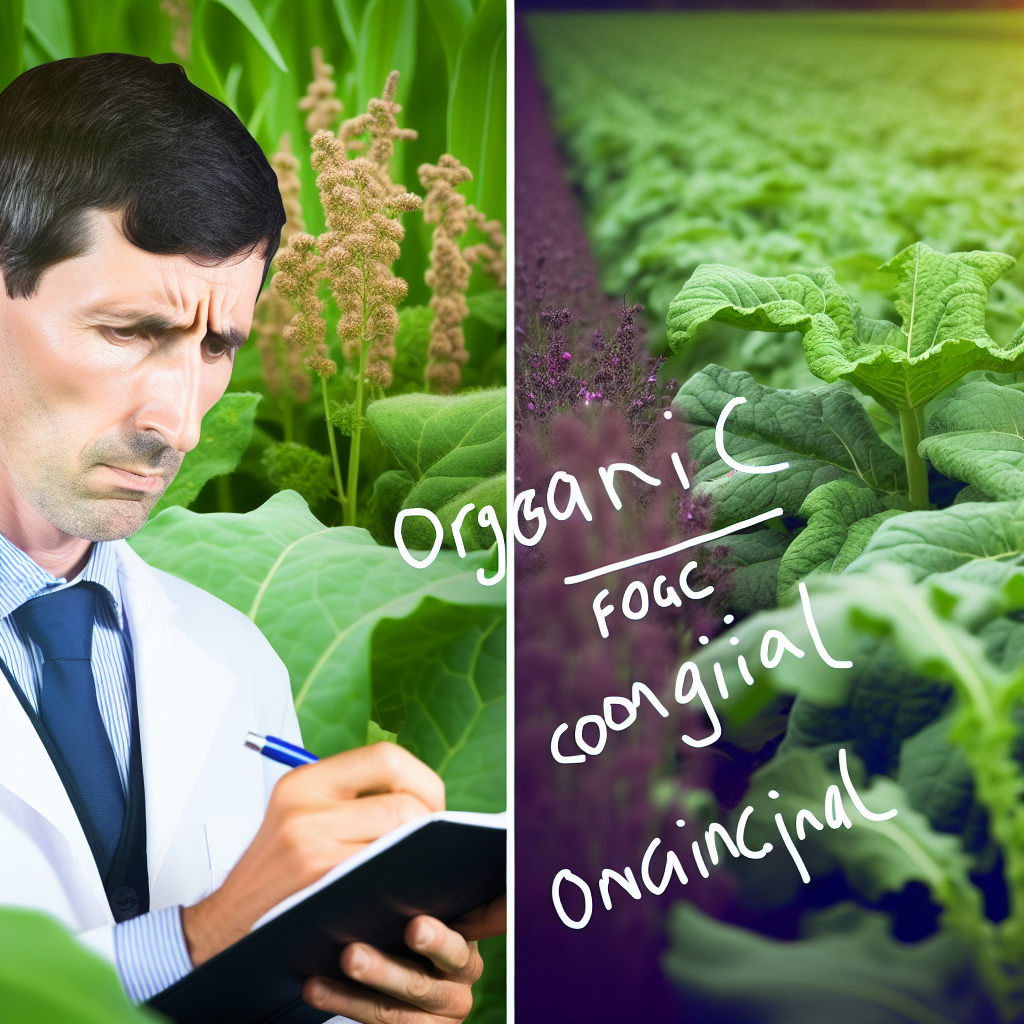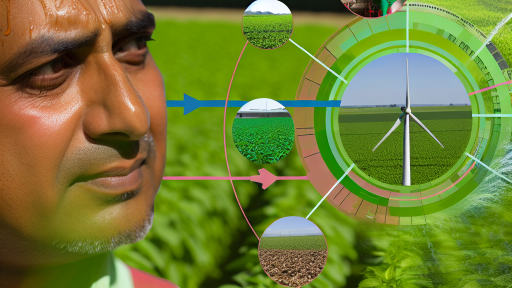Differences Between Organic and Conventional Farming
Definition of Organic Farming
Organic farming relies on natural processes and cycles.
This method emphasizes biodiversity and ecological balance.
Farmers use organic fertilizers and pest control methods.
Moreover, they avoid synthetic chemicals and genetically modified organisms.
Organic farming promotes soil health through crop rotation and cover cropping.
This approach helps create a sustainable agricultural system.
Definition of Conventional Farming
Conventional farming focuses on maximizing crop yields.
This method often uses synthetic fertilizers and pesticides.
Farmers aim for efficient production using advanced technologies.
They prioritize profit margins and market demands over sustainability.
Conventional practices can lead to soil degradation over time.
Today, it remains the dominant agricultural method worldwide.
Key Differences in Farming Practices and Techniques
Approach to Soil Health
Organic farming emphasizes building healthy soil.
Farmers use compost and natural fertilizers to enhance soil fertility.
This practice promotes beneficial microorganisms and reduces erosion.
Transform Your Agribusiness
Unlock your farm's potential with expert advice tailored to your needs. Get actionable steps that drive real results.
Get StartedIn contrast, conventional farming often relies on synthetic fertilizers.
This approach can lead to soil depletion over time.
Pest and Weed Management
Organic farms utilize natural pest control methods.
Farmers might introduce beneficial insects or use crop rotation techniques.
These methods maintain ecological balance and biodiversity.
On the other hand, conventional farming frequently employs chemical pesticides.
This can lead to chemical residues and potential health concerns.
Seeds and Genetic Modification
Organic farmers use non-GMO seeds for cultivation.
This practice ensures the preservation of traditional plant varieties.
Conventional farming, however, may include genetically modified organisms (GMOs).
GMOs are engineered for specific traits, such as pest resistance.
Certification and Regulations
Organic farming requires adherence to strict certification standards.
Farmers must follow guidelines set by regulatory bodies.
This includes avoiding synthetic chemicals for a specified period.
Conversely, conventional farming faces fewer regulatory constraints.
This offers more flexibility in farming practices.
Market Demand and Consumer Perception
There is a growing demand for organic produce among consumers.
Many perceive organic food as healthier and more environmentally friendly.
In contrast, conventional products often dominate the market due to lower prices.
However, many consumers are becoming more conscious of sustainability.
Environmental Impact
Organic farming promotes biodiversity and reduces pollution.
It minimizes the carbon footprint by avoiding synthetic inputs.
On the contrary, conventional farming practices can contribute to environmental degradation.
This includes issues like water contamination and loss of biodiversity.
Showcase Your Farming Business
Publish your professional farming services profile on our blog for a one-time fee of $200 and reach a dedicated audience of farmers and agribusiness owners.
Publish Your ProfileImpact on Soil Health: Organic vs. Conventional Approaches
Soil Composition
Organic farming enhances soil composition significantly.
It uses natural amendments like compost and manure.
Consequently, this approach improves soil quality over time.
In contrast, conventional farming relies heavily on synthetic fertilizers.
This practice can lead to degraded soil and reduced fertility.
Biodiversity and Microbial Life
Organic methods promote a diverse ecosystem in the soil.
This diversity supports beneficial microorganisms and insects.
These organisms help in nutrient cycling and soil health.
Conventional farming often disrupts this balance.
As a result, it can reduce microbial populations significantly.
Soil Structure and Erosion
Organic practices enhance soil structure through increased organic matter.
Improved structure promotes better water retention and drainage.
This reduces the risk of erosion during heavy rains.
Conversely, conventional farming can lead to compacted soil.
A compacted soil is more susceptible to erosion and runoff.
Chemical Inputs and Soil Contaminants
Organic farming minimizes the use of synthetic chemicals.
This practice prevents soil contamination from harmful residues.
It prioritizes natural pest management strategies instead.
On the other hand, conventional farming often involves pesticides and herbicides.
These chemicals can accumulate in the soil and harm its biology.
Long-term Sustainability
Organic farming promotes long-term soil sustainability.
Healthy soil contributes to future agricultural productivity.
This ensures the ongoing availability of food resources.
Conventional practices may yield higher short-term outputs.
However, they risk long-term soil degradation and food security.
Learn More: Choosing The Right Organic Certification Body
Pesticide and Chemical Use: A Comparative Analysis
Understanding Organic Farming Practices
Organic farming avoids synthetic pesticides and fertilizers.
Farmers rely on natural alternatives to manage pests.
These alternatives include beneficial insects and crop rotation.
Thus, organic practices promote soil health and biodiversity.
Insights into Conventional Farming Standards
Conventional farming often employs chemical pesticides and fertilizers.
These substances are used to maximize crop yields efficiently.
Farmers use integrated pest management techniques to reduce losses.
Consequently, conventional farming may yield higher short-term profits.
Impact on Human Health
Organic crops may contain fewer pesticide residues.
This factor raises concerns about chemical exposure among consumers.
In contrast, the long-term effects of conventional pesticides remain debated.
Many studies suggest that certain chemicals may pose health risks.
Environmental Considerations
Organic farming practices contribute to lower environmental pollution.
They help maintain local ecosystems and water quality.
Showcase Your Farming Business
Publish your professional farming services profile on our blog for a one-time fee of $200 and reach a dedicated audience of farmers and agribusiness owners.
Publish Your ProfileIn comparison, conventional farming can lead to chemical runoff.
This runoff often results in detrimental effects on wildlife and waterways.
Economic Factors
Organic farming may require higher upfront costs and labor.
However, many consumers are willing to pay premium prices.
On the other hand, conventional farming generally leads to lower costs.
This approach can ensure affordability for mass markets.
Regulatory Differences
Organic farming undergoes strict certification processes.
Regulatory agencies monitor compliance with organic standards.
Conversely, conventional practices often have fewer restrictions.
This disparity can affect consumer perceptions and market trends.
Delve into the Subject: Essential Export Documentation for Farmers
Nutritional Value of Products
Comparing Organic and Conventional Produce
Organic produce often contains higher levels of certain nutrients.
Studies indicate that organic fruits and vegetables may have more antioxidants.
Antioxidants help protect the body from oxidative stress.
Conventional produce may show higher pesticide residues despite being safe.
Thus, washing conventional produce is essential.
Vitamin Content
Some research suggests that organic products may provide more vitamins.
In particular, vitamins A and C appear more abundant in organic options.
This is crucial for maintaining overall health.
Mineral Availability
Organic farming often improves soil health.
Healthy soil boosts mineral availability in crops.
Consequently, organic produce may have increased iron and magnesium levels.
Consumer Perceptions and Studies
Many consumers believe organic produce is healthier and more nutritious.
However, studies show mixed results on nutritional superiority.
Some experts argue that the differences are not always significant.
Environmental Factors
Organic farming uses methods that support ecological balance.
This may lead to produce with a better nutrient profile.
Conventional methods can affect the ecosystem negatively.
Find Out More: How Biotechnology Regulations Impact Modern Farming

Environmental Impact: Sustainability and Biodiversity Considerations
Understanding Sustainability
Sustainability refers to practices that do not deplete resources.
Organic farming emphasizes sustainability by using natural methods.
These methods often include crop rotation and natural pest control.
Consequently, organic farming helps maintain ecological balance.
Moreover, it promotes healthy soil and protects water resources.
Biodiversity Considerations
Biodiversity is crucial for resilient ecosystems.
Organic farming encourages a diverse range of plants and animals.
This diversity supports pest control and pollination.
By contrast, conventional farming often leads to monocultures.
Monocultures can reduce biodiversity and harm ecosystems.
Environmental Impacts of Conventional Farming
Conventional farming relies heavily on chemical fertilizers and pesticides.
Showcase Your Farming Business
Publish your professional farming services profile on our blog for a one-time fee of $200 and reach a dedicated audience of farmers and agribusiness owners.
Publish Your ProfileThese chemicals can contaminate soil and water sources.
They also pose health risks to both consumers and farmworkers.
In addition, conventional practices can lead to habitat destruction.
This destruction diminishes wildlife populations in many regions.
Benefits of Organic Practices
Organic farming methods improve soil fertility and structure.
Healthy soil supports better crop yields over time.
Furthermore, organic farming is less harmful to wildlife.
It helps restore natural habitats that have been degraded.
Ultimately, these practices contribute to long-term sustainability.
Community and Economic Impacts
Consumers often support sustainable farming through their purchasing power.
This support can drive local economies and create jobs.
Such economic benefits extend to farmers who adopt organic methods.
Additionally, local food systems enhance community resilience.
Overall, fostering sustainable and organic practices benefits everyone.
See Related Content: Essential Tax Tips for Agricultural Businesses
Economic Aspects
Cost of Production
The cost of production significantly differs between organic and conventional farming.
Organic farming typically incurs higher production costs.
This increase arises from labor-intensive practices and rigorous certification processes.
In contrast, conventional farming benefits from economies of scale.
Conventional methods often rely on chemical inputs, which can be less expensive.
Therefore, the choice of farming practice influences overall expenses significantly.
Market Prices
Market prices of organic and conventional products also vary considerably.
Organic products usually command higher market prices than conventional ones.
Consumers often pay a premium for organic due to perceived health benefits.
This willingness to pay drives demand for organic products in many markets.
Additionally, factors like supply chain and product availability affect prices.
Conventional products tend to have lower market prices due to higher production volumes.
Price Volatility
Price volatility presents another contrast between the two farming types.
Organic prices can be more stable due to consistent consumer demand.
Conversely, conventional market prices may fluctuate based on input costs.
This volatility often affects farmers’ profitability in conventional systems.
Farmers then may need to adapt their strategies to maintain revenue.
Long-Term Economic Sustainability
Long-term economic sustainability matters in the choice of farming methods.
Organic farms can enjoy premium prices, promoting sustainability over time.
These practices often enhance soil health and biodiversity, reducing future costs.
In contrast, conventional agriculture may rely heavily on non-renewable resources.
This can lead to higher long-term environmental remediation costs.
Consequently, the economic aspects of these farming types affect sustainability planning.
Consumer Perceptions and Health Benefits
Understanding Consumer Preferences
Consumers often perceive organic products as healthier than conventional ones.
This belief stems from the absence of synthetic pesticides and fertilizers in organic farming.
Showcase Your Farming Business
Publish your professional farming services profile on our blog for a one-time fee of $200 and reach a dedicated audience of farmers and agribusiness owners.
Publish Your ProfileAdditionally, many consumers value the environmental benefits associated with organic practices.
Research shows that organic consumers are often more health-conscious overall.
Moreover, they tend to prioritize ethical and sustainable consumption.
Health Benefits of Organic Foods
Organic foods generally contain fewer pesticide residues compared to conventional varieties.
Consequently, they may pose a lower risk of exposure to harmful chemicals.
Many studies suggest that organic produce contains higher levels of antioxidants.
A diet rich in antioxidants can support overall health and well-being.
Furthermore, organic livestock are raised without antibiotics and growth hormones.
The Role of Labels and Certifications
Labeling plays a significant role in consumer decisions regarding organic versus conventional foods.
Consumers often look for recognized certifications to ensure product authenticity.
The USDA Organic label is one of the most trusted organic certifications in the market.
Transparency in labeling enhances consumer confidence in organic products.
Perception of Taste and Quality
Many consumers believe organic foods taste better than conventional counterparts.
This perception can be attributed to the principles of organic farming, which emphasize quality.
Research indicates that flavor profiles vary based on growing methods and soil health.
As a result, some consumers report a preference for the taste of organic fruits and vegetables.




